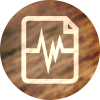Disaster plans are not always top of mind for most homeowners until there is a threat of a natural disaster occurrence. And although your area may be less prone to a natural disaster, it is always good to be prepared with a plan. When creating your disaster plan, whether it be for a hurricane, tornado, or flood, you should always store away important documents in a safe place.
Protect Your Important Papers and Documents
You can avoid the paper chase during a storm by scanning and making copies of your important documents. These documents can be placed in a fire-proof vault, lock box, or safe deposit box at the bank. There should also be an electronic copy saved to a USB or other type of external drive. There are even smartphone apps that allow you to save all of your important data in one place. So now let’s take a look at what is considered important and save-worthy.
Emergency Contacts
Make a list of emergency contacts including both in-state and out-of-state contacts. Your list should include phone numbers of:
- Everyone in your household
- Neighbors
- Relatives you engage with frequently
- Doctors
- Insurance Agents
Personal Credentials
Be sure to have copies of important personal credentials, including the following:
- Birth certificate
- Social Security card
- Driver’s license (front and back)
- Credit and debit cards (front and back)
- Marriage certificate or divorce decree
- Passport
- Living will
- Executor and estate planning paperwork
- Diploma
Property Documents
It is equally important to put your property documents in a safe place. At the very minimum, the following should be copied and saved:
- Mortgage statements
- Home deed
- Car title
- Insurance policies
- Appraisal documents
Medical and Financial Statements
Lastly, you should include your medical and financial statements. The following should be included:
- Health insurance card
- Prescription records
- Bank statements
- Tax records
- Stock and bond certificates
- IRA or 401(k) account numbers
Contact information, personal certificates, and home, medical, and financial statements are all extremely valuable. Along with these documents, it is also a good idea to have digital copies of your photos, so that those memories are not lost due to a natural disaster. Stay ahead of the storm and start documenting, copying, and storing all important documents in a safe place before it is too late and you risk losing irreplaceable and invaluable items.
For more information on how to keep your important documentation safe, visit AARP.




